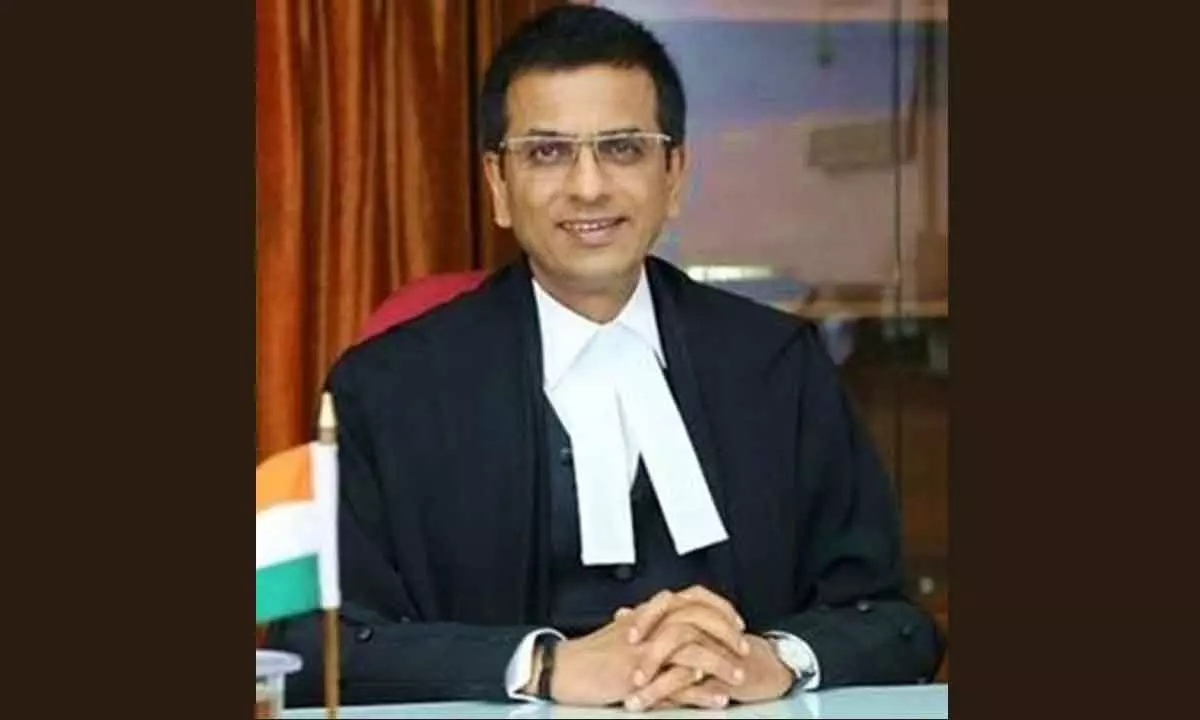Live
- G20 Leaders Will Talk About Climate, Taxes, and Trump's Return in Brazil
- COP29: CDRI announces $8 million funding for 12 projects to address climate crisis
- Anti-Telgu remarks: Actor Kasthuri Shankar moves court for bail
- Samsung AR Smart Glasses Set to Launch in 2025, Featuring Ray-Ban Meta-Like Design
- Kerala Industries Minister confident that new policy will boost plantation sector
- Madras HC plans inter-departmental monitoring committee to combat drug use in TN
- Bihar: Spotted deer dies due to heart attack in Banka district
- Mushtaq Ali T20: Shami to spearhead Bengal bowling attack, Gharami named captain
- Kharge's clarion call to oust Maharashtra's BJP-backed MahaYuti
- Why Ukraine’s Use of US Missiles Against Russia Could Lead to World War 3
Just In
Participation of women in workforce is a constitutional entitlement: SC

Justice DY Chandrachud
Observing that the participation of women in the workforce is not a matter of privilege, but a constitutional entitlement, the Supreme Court has ordered the Himachal Pradesh Government to form a committee chaired by the Chief Secretary to reconsider the entire aspect of the grant of Child Care Leave to working mothers
New Delhi: Observing that the participation of women in the workforce is not a matter of privilege, but a constitutional entitlement, the Supreme Court has ordered the Himachal Pradesh Government to form a committee chaired by the Chief Secretary to reconsider the entire aspect of the grant of Child Care Leave to working mothers.
A Bench presided over by Chief Justice of India (CJI), DY Chandrachud, was hearing a Special Leave Petition filed by a woman assistant professor aggrieved with the non-adoption of Child Care Leave in Himachal Pradesh.
The appellant submitted that due to the treatment of her son, who suffers from a rare genetic disorder and has undergone several surgeries since birth, she has exhausted all her sanctioned leave.
Saying that the petition raises a “serious matter of concern”, the Bench, also comprising Justice JB Pardiwala said, “The State as a model employer cannot be oblivious to the special concerns which arise in the case of women who are part of the workforce. The provision of Child Care Leave to women sub-serves the significant constitutional object of ensuring that women are not deprived of their due participation as members of the workforce. Otherwise, in the absence of a provision for the grant of Child Care Leave, a mother may well be constrained to leave the workforce.”
The top court said that the policies of the State have to be consistent and must be synchronised with constitutional protections and safeguards, observing that the participation of women in the workforce is not a matter of privilege, but a constitutional entitlement protected by Articles 14, 15, Article 19(1)(g) and 21 of the Constitution.
Asking the state government to reconsider the entire aspect of the grant of Child Care Leave to mothers, including making special provisions consistent with the objects and purpose of the Rights of Persons with Disabilities (RPWD) Act, 2016 to mothers who are bringing up children with special needs, it ordered for formation of a committee chaired by the Chief Secretary and comprising of the State Commissioner appointed under the RPWD Act and Secretaries of the Women and Child Development Department and the Social Welfare Department to look into all aspects of the matter.
“The report of the Committee shall be placed before the competent authority so that a considered policy decision is taken expeditiously. The report of the Committee shall be prepared by July 31, 2024 and submitted to this Court as well,” the Supreme Court said.
In the meantime, pending further orders, the application by the appellant for the grant of special leave will be favorably considered by the competent authorities, added the SC order.
Earlier in 2021, the Himachal Pradesh High Court had dismissed the writ petition filed by the appellant on the ground that Rule 43-C of the Central Civil Service (Leave) Rules, 1971 has been deleted by the Himachal Pradesh Government.
By an Office Memorandum, the Union Government in March 2010 resolved to permit Child Care Leave for women employees with differently-abled children up to the age of 22 years subject to the conditions stipulated by the government in this regard from time to time.

© 2024 Hyderabad Media House Limited/The Hans India. All rights reserved. Powered by hocalwire.com






